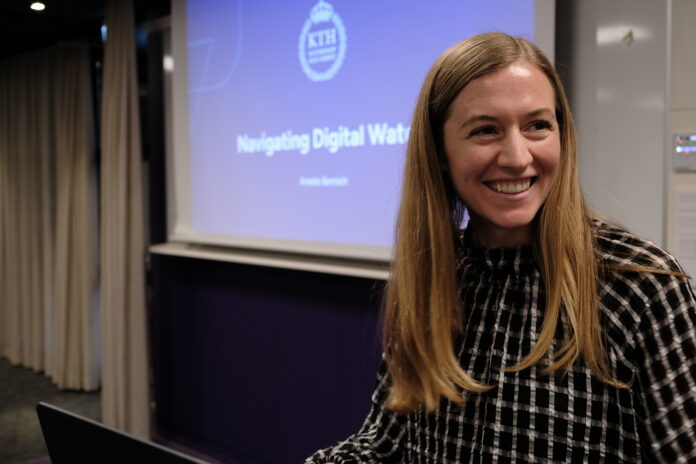Digitalization in the water sector – our PhD student defends her thesis!
Digitalization is expected to fundamentally change all parts of society, including the water and wastewater industry. But is digital technology equally pervasive across all sectors, and what might a digitized water industry look like? Our PhD student Amelie Bennich is ready to present her interesting thesis, which challenges the image of the industry in several ways.

In project 2.1 Navigating digital waters, our PhD student Amelie Bennich has taken as her starting point one of the biggest technological trends of our time – digitalization. Despite high expectations of how digitalization will affect virtually all levels of society, many industries and sectors are still in the early stages of digitalization. This project has focused on how the water and wastewater industry is affected, whether a digital transformation will happen – and if so, what it might look like.
What are the key messages of your thesis?
– In my thesis, I have wanted to challenge two dominant narratives, the disruptive image of digitization and the conservative image of the water industry. There is no doubt that digitalization has had a major impact on some industries, such as the music and media industries. But in other areas, such as water and wastewater, the disruptive power of digitalization is less clear. Although the water and wastewater industry is often seen as difficult to change, digitization is happening, albeit in a way that differs from the examples we often see. To understand how digitalization is evolving, it is crucial to identify both what can actually be digitalized and which actors are promoting or limiting this development.
Who do you hope will read and benefit from your work?
– Everyone who is interested in digitalization! I hope this thesis will be of interest to anyone interested in technology development and how new technology affects our society in general, in this case with a special focus on digital technology. Then, of course, I hope that it will be useful for actors in the water and wastewater industry, not least the water and wastewater organizations that have a central role in the digitalization of this industry.
How has doctoral life been?
– Doctoral life is clearly a journey, with both ups and downs. I found the Covid period challenging for my thesis work, not least because it occurred at the beginning of my doctoral studies, which is a period when it is particularly important to meet others and discuss thoughts and ideas. The most enjoyable part has undoubtedly been all the people I have had the opportunity to meet and get to know during these years. Both colleagues at the department and via Mistra InfraMaint, but also people I’ve met during data collection, conferences and courses.
But we’re not saying goodbye to Amelie Bennich quite yet; at the beginning of next year, she will remain at KTH and work on a continuation project within the framework of Mistra InfraMaint. The project aims to make an international comparison to identify countries where the water and wastewater sector has come further in its digitalization.
– The hope is to find instructive examples that the Swedish water and wastewater industry can be inspired by.
On December 13, it is time for Amelie Bennich to defend her thesis Navigating Digital Waters: Exploring the digital transformation of urban water systems. You can read more and participate digitally here.
Read more about the new project here.